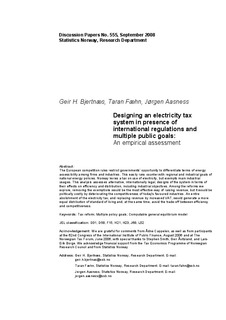Designing an electricity tax system in presence of international regulations and multiple public goals : an empirical assessment
Working paper

Åpne
Permanent lenke
http://hdl.handle.net/11250/180595Utgivelsesdato
2008Metadata
Vis full innførselSamlinger
- Discussion Papers [1003]
Sammendrag
Abstract:
The European competition rules restrict governments’ opportunity to differentiate terms of energy accessibility among firms and industries. This easily runs counter with regional and industrial goals of national energy policies. Norway levies a tax on use of electricity, but exempts main industrial usages. This analysis assesses alternative, internationally legal, designs of the system in terms of their effects on efficiency and distribution, including industrial objectives. Among the reforms we explore, removing the exemptions would be the most effective way of raising revenue, but it would be politically costly by deteriorating the competitiveness of today's favoured industries. An entire abolishment of the electricity tax, and replacing revenue by increased VAT, would generate a more equal distribution of standard of living and, at the same time, avoid the trade-off between efficiency and competitiveness.
Keywords: Tax reform; Multiple policy goals; Computable general equilibrium model
JEL classification: D31, D58, F15, H21, H23, J68, L52
Utgiver
Statistics Norway, Research DepartmentSerie
Discussion Papers;No. 555Beslektede innførsler
Viser innførsler beslektet ved tittel, forfatter og emneord.
-
The impacts of alternative policy instruments on environmental performance. A firm level study of temporary and persistent effects
Bye, Brita; Klemetsen, Marit Elisabeth (Discussion papers;788, Working paper, 2014-10)We study the effects of various environmental regulations on environmental performance measured as emission intensity. Moreover, we aim to test whether any such effects are persistent or only temporary. Conventional theory ... -
The welfare effects of carbon policies: grandfathered quotas versus differentiated taxes
Bye, Brita; Nyborg, Karine (Discussion Papers;No. 261, Working paper, 1999)Recently, it has been demonstrated that pre-existing distortionary taxes can substantially increase the costs of market-based instruments which do not raise revenue, such as non-auctioned emissions quotas. Revenue-raising ... -
Labour market rigidities and environmental tax reforms : welfare effects of different regimes
Bye, Brita (Discussion Papers;No. 242, Working paper, 1998)The working of the labour market is important for the total welfare effects of tax reforms. This paper analyses, by using a computable general equilibrium model for the Norwegian economy, how different assumptions about ...